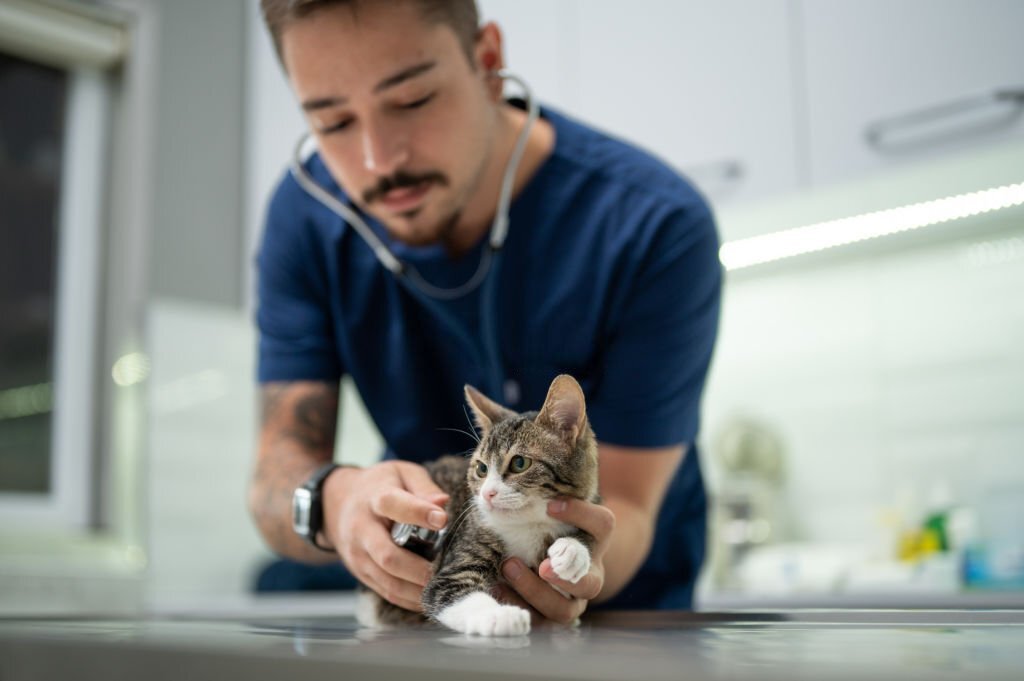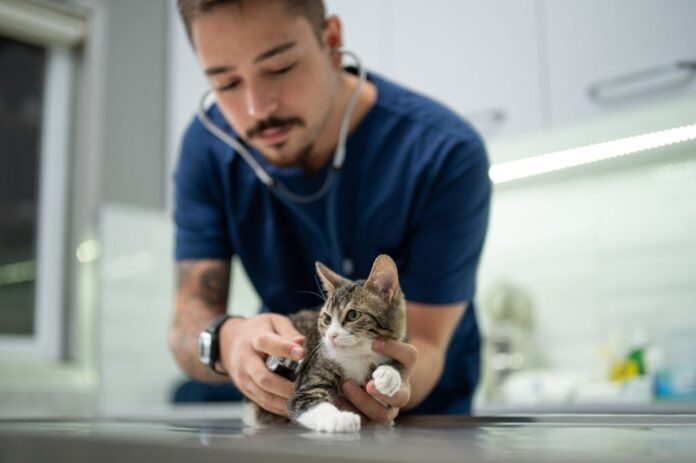Introduction
Taking your cat to the vet regularly is an essential part of being a responsible cat owner. Just like humans, cats need regular check-ups and preventative care to ensure they stay healthy and happy. Regular vet visits can help detect any potential health issues early on, allowing for prompt treatment and a better prognosis. In this article, we will explore the importance of regular vet visits for cats, discuss their unique health needs, and provide tips for making vet visits less stressful for your feline friend.

The Importance of Regular Vet Visits for Cats
Regular vet visits are crucial for maintaining your cat’s overall health and well-being. Cats are masters at hiding signs of illness, so it can be challenging to detect any health issues until they become more severe. By taking your cat to the vet regularly, you give the veterinarian an opportunity to examine your cat thoroughly and identify any potential health concerns.
Additionally, regular vet visits allow for preventative care measures to be taken. This includes vaccinations, parasite prevention, and dental care. Preventative care is essential in keeping your cat healthy and preventing the onset of certain diseases or conditions. Vaccinations protect your cat from potentially life-threatening diseases, while parasite prevention helps keep them free from fleas, ticks, and worms. Dental care is also crucial as dental problems can lead to pain, infection, and other health issues.
Understanding Your Cat’s Health Needs
Cats have unique health needs that differ from other animals. They are prone to certain diseases and conditions that require special attention. For example, cats are susceptible to urinary tract infections, which can be painful and potentially life-threatening if left untreated. They are also prone to dental problems such as periodontal disease, which can lead to tooth loss and other health complications.
Cats are obligate carnivores, meaning they require a diet that is high in animal protein. Feeding them a balanced diet that meets their nutritional needs is crucial for their overall health. Cats also have specific dietary requirements, such as the need for taurine, an essential amino acid that is found only in animal tissues. Without adequate taurine, cats can develop serious health issues, including heart disease and vision problems.
Signs Your Cat Needs to Visit the Vet
It’s important to be aware of the signs that your cat may need to see a vet. Cats are masters at hiding signs of illness, so it’s crucial to pay attention to any changes in their behavior or appetite. Some common signs that your cat may need to visit the vet include:
1. Changes in appetite: If your cat suddenly loses interest in food or starts eating significantly less, it could be a sign of an underlying health issue.
2. Changes in litter box habits: If your cat starts urinating outside of the litter box or has difficulty urinating, it could be a sign of a urinary tract infection or other urinary issue.
3. Changes in behavior: If your cat becomes more lethargic, withdrawn, or aggressive, it could be a sign of pain or illness.
4. Weight loss or gain: Significant changes in your cat’s weight can indicate an underlying health issue.
5. Vomiting or diarrhea: Occasional vomiting or diarrhea is normal for cats, but if it becomes frequent or persistent, it’s important to have your cat checked by a vet.
How Often Should You Take Your Cat to the Vet?
The frequency of vet visits for your cat will depend on their age and health status. Kittens require more frequent vet visits than adult cats as they need to receive their initial vaccinations and be monitored for any developmental issues. Generally, kittens should see a vet every 3-4 weeks until they are around 16 weeks old.
Adult cats should see a vet at least once a year for a routine check-up and vaccinations. However, older cats or cats with pre-existing health conditions may require more frequent visits. It’s important to consult with your vet to determine the appropriate frequency of visits for your cat.
Preventative Care for Cats: What to Expect at the Vet
During a routine vet visit, your cat will undergo a thorough examination. The vet will check their weight, temperature, heart rate, and respiratory rate. They will also examine their eyes, ears, teeth, and coat for any signs of abnormalities. The vet may also recommend blood tests or other diagnostic procedures to assess your cat’s overall health.
Preventative care measures that vets may recommend for cats include vaccinations, parasite prevention, and dental care. Vaccinations protect your cat from diseases such as rabies, feline distemper, and feline leukemia. Parasite prevention involves regular treatments to protect your cat from fleas, ticks, and worms. Dental care may include regular cleanings or treatments for dental issues such as periodontal disease.
Common Health Issues in Cats and How to Address Them
Cats can experience a variety of health issues throughout their lives. Some of the most common health issues in cats include dental problems, urinary tract infections, obesity, and kidney disease.
Dental problems are prevalent in cats and can lead to pain, infection, and tooth loss if left untreated. Regular dental care, including brushing your cat’s teeth and providing dental treats or toys, can help prevent dental issues. If your cat already has dental problems, your vet may recommend a dental cleaning or other treatments.
Urinary tract infections are also common in cats, especially in males. Symptoms of a urinary tract infection include frequent urination, straining to urinate, blood in the urine, and urinating outside of the litter box. If you notice any of these signs, it’s important to take your cat to the vet for a proper diagnosis and treatment.
Obesity is a growing concern in cats and can lead to a variety of health issues, including diabetes, arthritis, and heart disease. Maintaining a healthy weight for your cat through proper diet and exercise is crucial for their overall health.
Kidney disease is another common health issue in cats, especially as they age. Regular vet visits can help detect kidney disease early on, allowing for prompt treatment and management of the condition.
The Cost of Vet Visits for Cats: Is it Worth It?
The cost of vet visits for cats can vary depending on the services provided and the location. Routine check-ups and vaccinations are generally affordable, but more extensive procedures or treatments can be costly. However, the cost of vet visits is a worthwhile investment in your cat’s health and well-being.
Regular vet visits can help detect any potential health issues early on, which can save you money in the long run. By addressing health issues promptly, you can prevent them from becoming more severe and requiring more extensive and expensive treatments.
Additionally, preventative care measures such as vaccinations and parasite prevention can help prevent costly health issues from arising in the first place. Vaccinations protect your cat from potentially life-threatening diseases, while parasite prevention helps keep them free from fleas, ticks, and worms.
Tips for Making Vet Visits Less Stressful for Your Cat
Visiting the vet can be stressful for cats, but there are steps you can take to make the experience less anxiety-inducing for them. Here are some tips for reducing your cat’s stress during vet visits:
1. Use pheromone sprays: Pheromone sprays, such as Feliway, can help create a calming environment for your cat. Spray the carrier and the car with the pheromone spray before the vet visit.
2. Bring familiar items from home: Bringing familiar items, such as a blanket or toy, can provide comfort to your cat during the vet visit.
3. Use a secure carrier: Make sure your cat is in a secure carrier during the car ride and at the vet’s office. This will help prevent them from escaping and reduce their anxiety.
4. Practice handling and restraint: Get your cat used to being handled and restrained by gently touching their paws, ears, and mouth. This will make it easier for the vet to examine them during the visit.
5. Reward with treats: Bring some of your cat’s favorite treats to reward them for good behavior during the vet visit. This positive reinforcement can help make the experience more positive for them.
The Role of Vaccinations in Your Cat’s Health
Vaccinations play a crucial role in protecting your cat from potentially life-threatening diseases. Vaccines stimulate your cat’s immune system to produce antibodies that can fight off specific diseases. Some of the most common vaccines for cats include:
1. Rabies vaccine: Rabies is a deadly disease that can be transmitted to humans. Vaccinating your cat against rabies is not only important for their health but also for public health.
2. Feline distemper vaccine: Feline distemper, also known as panleukopenia, is a highly contagious viral disease that can be fatal. Vaccinating your cat against feline distemper is essential for their protection.
3. Feline leukemia vaccine: Feline leukemia is a viral disease that can weaken your cat’s immune system and make them more susceptible to other infections and diseases. Vaccinating your cat against feline leukemia is recommended, especially if they go outdoors or come into contact with other cats.
It’s important to consult with your vet to determine which vaccines are necessary for your cat based on their lifestyle and risk factors.
Finding the Right Vet for Your Feline Friend
Finding the right vet for your cat is crucial for their health and well-being. Here are some tips for finding a vet that is a good fit for your cat:
1. Consider their experience with cats: Look for a vet who has experience working with cats and understands their unique needs and behaviors.
2. Ask for recommendations: Ask friends, family, or fellow cat owners for recommendations on good vets in your area.
3. Visit the clinic: Schedule a visit to the clinic to get a sense of the environment and how the staff interacts with the animals. Make sure the clinic is clean and well-maintained.
4. Consider their bedside manner: A good vet should be patient, compassionate, and willing to answer any questions you may have. They should also be able to handle your cat gently and with care.
5. Trust your instincts: Ultimately, trust your instincts when choosing a vet. If something doesn’t feel right or you don’t feel comfortable with the vet, it’s okay to look for another option.
Conclusion
Regular vet visits are essential for maintaining your cat’s health and well-being. By taking your cat to the vet regularly, you give them the best chance at early detection of any health issues and preventative care. Understanding your cat’s unique health needs and being aware of the signs that they may need to see a vet is crucial for their overall health. While vet visits can be costly, they are a worthwhile investment in your cat’s health and can save you money in the long run. By following the tips provided in this article, you can make vet visits less stressful for your cat and ensure they receive the care they need to live a long and healthy life.


